I know the following seems like an odd thing to commemorate, but I have a few reasons for doing so. The reason I can talk about here is that I plan on talking about Theodore Roethke next semester in my seminar, "From Angst to Art." Maybe I will write about the seminar in this blog, examining how my thoughts shift and grow over the course of the semester.
I've always wanted to teach a course on literature and survival or writing and healing. I don't believe that all artists create because they are striving through their art to be whole, but the artists who are most interesting to me do. For a long time, I was ashamed to admit my writing was a form of healing; I was afraid my work would be diminished in others' eyes because of that. After researching, however, I've become emboldened to talk about it and to weave this philosophy into my teaching.
For a short time, I kept a separate blog on my teaching life. I did this because I felt my teaching life was destroying my creative life. Thankfully, my position at the University has changed, and I'm getting more opportunity to teach literature and creative writing all the time. In fact, after this academic year, I will no longer teach freshman composition at all. I love teaching freshmen, and I don't mind teaching composition, but it's so much work, so much grading, so much attention to technical detail and departmental requirements, that I feel wrung out like a washcloth by the time each semester ends. Now, my "two lives" can become the same, so I will soon be deleting the teaching blog and will talk more about my teaching here.
For over a year now, Roethke's life and work have consumed my attention. I've been on Amazon and ordered every book, new or used, that has been written about him. I'd known his poem, "The Waking" for many years, of course, but I really knew little about Roethke until quite recently. Roethke was a dynamic man, passionate and driven.
When he was in his late twenties, he had a psychotic episode, and he was to continue to have trouble and be in and out of hospitals all his life. He even had shock treatments at one point. Through it all, he kept writing. It has been fascinating for me over the past year to read of how his poetry helped him to know himself better, to tunnel toward the divine. "We think by feeling," he wrote in "The Waking." I remember this line every day of my life because that's how I want to live my life, that's the kind of teacher I want to be.
I love the month of November. The earth goes into hibernation and the rain and snow break down the leaves into mulch for worms. The hardwoods stand naked and you start to get the first really cold days and nights of the season. I wonder what it was like for Roethke, a young man just starting out in his career as a teacher and poet, wandering around on that cold November night, losing his shoe and thinking he'd suddenly found himself closer to God?
Bless you, Ted Roethke, wherever your spirit may be. Bless you and thank you for your poems.
-------------------------------------
From the Literary Notebook:
On this day in 1935, 27-year-old Theodore Roethke was hospitalized for the first of the manic-depressive breakdowns that would recur throughout his life. Roethke had just begun a teaching post at Michigan State University and, according to colleagues, had been drinking heavily all semester, dozens of cups of coffee and bottles of cola a day as well as alcohol. On the previous evening, a cold one, he had taken a long walk in the woods without a coat and eventually with only one shoe; the next morning, after deciding "to cut my eight o'clock class deliberately just to see how long they would stick around," Roethke took another walk in the woods, also coatless. He was shivering and delirious when he arrived at the dean's office, where he planned "to explain one or two things about this experiment"; the dean, trained as a mathematician, called for the doctors. Roethke later told friends that while on his first walk he had had a mystical experience with a tree -- even pointed out the tree, while retrieving his shoe. The tree taught him "the secret of Nijinsky," he said, perhaps referring to that passage in Nijinsky's diary -- written while Nijinsky was a mental patient -- that describes learning from a tree that "human beings do not understand feelings."
Sunday, November 12, 2006
Subscribe to:
Post Comments (Atom)
Pages
Dreaming
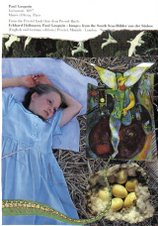
About Me

- Theresa Williams
- Northwest Ohio, United States
- "I was no better than dust, yet you cannot replace me. . . Take the soft dust in your hand--does it stir: does it sing? Has it lips and a heart? Does it open its eyes to the sun? Does it run, does it dream, does it burn with a secret, or tremble In terror of death? Or ache with tremendous decisions?. . ." --Conrad Aiken
Followers
Facebook Badge
Search This Blog
Favorite Lines
My Website
Epistle, by Archibald MacLeish
Visit my Channel at YouTube
Great Artists
www.flickr.com
This is a Flickr badge showing public photos from theresarrt7. Make your own badge here.
Fave Painting: Eden
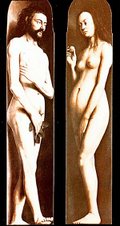
Fave Painting: The Three Ages of Man and Death

by Albrecht Dürer
From the First Chapter
The Secret of Hurricanes : That article in the Waterville Scout said it was Shake- spearean, all that fatalism that guides the Kennedys' lives. The likelihood of untimely death. Recently, another one died in his prime, John-John in an airplane. Not long before that, Bobby's boy. While playing football at high speeds on snow skis. Those Kennedys take some crazy chances. I prefer my own easy ways. Which isn't to say my life hasn't been Shake-spearean. By the time I was sixteen, my life was like the darkened stage at the end of Hamlet or Macbeth. All littered with corpses and treachery.
My Original Artwork: Triptych
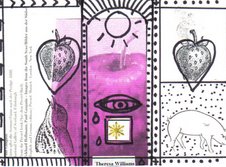
Wishing
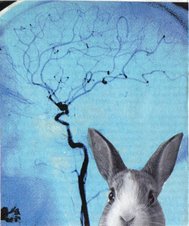
Little Deer
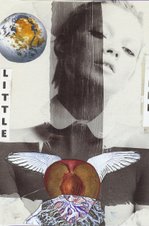
Transformation
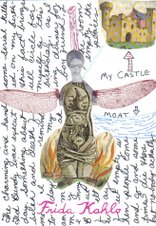
Looking Forward, Looking Back
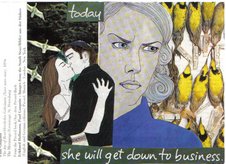
CURRENT MOON
Labels
- adolescence (1)
- Airstream (7)
- Alain de Botton (1)
- all nighters (2)
- Allen (1)
- altars (1)
- Angelus Silesius (2)
- animals (1)
- Annie Dillard (1)
- Antonio Machado (2)
- AOL Redux (1)
- April Fool (1)
- Archibald MacLeish (1)
- arts and crafts (55)
- Auden (1)
- awards (2)
- AWP (2)
- Bach (1)
- Basho (5)
- Beauty and the Beast (1)
- birthdays (1)
- blogs (5)
- boats (2)
- body (2)
- books (7)
- bookstores (1)
- Buddha (1)
- Buddha's Little Instruction Book (2)
- butterfly (4)
- buzzard (2)
- Capote (4)
- Carmel (1)
- Carson McCullers (1)
- cats (15)
- Charles Bukowski (1)
- Charles Simic (2)
- Christina Georgina Rossetti (1)
- church (2)
- confession (1)
- Conrad Aiken (1)
- cooking (5)
- crows (1)
- current events (2)
- D. H. Lawrence (3)
- death (6)
- Delmore Schwartz (4)
- detachment (1)
- dogs (7)
- domestic (3)
- dreams (21)
- Edward Munch (4)
- Edward Thomas (1)
- Eliot (3)
- Eliot's Waste Land (2)
- Emerson (2)
- Emily Dickinson (10)
- ephemera (1)
- Esalen (6)
- essay (3)
- Eugene O'Neill (3)
- Ezra Pound (1)
- F. Scott Fitzgerald (1)
- fairy tales (7)
- Fall (16)
- Famous Quotes (16)
- festivals (2)
- fire (5)
- Floreta (1)
- food (1)
- found notes etc. (1)
- found poem (2)
- fragments (86)
- Frida Kahlo (1)
- frogs-toads (4)
- Georg Trakl (1)
- gifts (1)
- Global Warming (1)
- Gluck (1)
- goats (1)
- Goodwill (1)
- Great lines of poetry (2)
- Haibun (15)
- haibun moleskine journal 2010 (2)
- Haiku (390)
- Hamlet (1)
- Hart Crane (4)
- Hayden Carruth (1)
- Henry Miller (1)
- holiday (12)
- Hyman Sobiloff (1)
- Icarus (1)
- ikkyu (5)
- Imagination (7)
- Ingmar Bergman (1)
- insect (2)
- inspiration (1)
- Issa (5)
- iTunes (1)
- Jack Kerouac (1)
- James Agee (2)
- James Dickey (5)
- James Wright (6)
- John Berryman (3)
- Joseph Campbell Meditation (2)
- journaling (1)
- Jung (1)
- Juniper Tree (1)
- Kafka (1)
- Lao Tzu (1)
- letters (1)
- light (1)
- Lorca (1)
- Lorine Niedecker (2)
- love (3)
- Lucille Clifton (1)
- Marco Polo Quarterly (1)
- Marianne Moore (1)
- Modern Poetry (14)
- moon (6)
- movies (20)
- Muriel Stuart (1)
- muse (3)
- music (8)
- Mystic (1)
- mythology (6)
- nature (3)
- New Yorker (2)
- Nietzsche (1)
- Northfork (2)
- November 12 (1)
- October (6)
- original artwork (21)
- original poem (53)
- Our Dog Buddha (6)
- Our Dog Sweet Pea (7)
- Our Yard (6)
- PAD 2009 (29)
- pad 2010 (30)
- Persephone (1)
- personal story (1)
- philosophy (1)
- Phoku (2)
- photographs (15)
- Picasso (2)
- Pilgrim at Tinker Creek (1)
- Pillow Book (5)
- Pinsky (2)
- plays (1)
- poem (11)
- poet-seeker (9)
- poet-seer (6)
- poetry (55)
- politics (1)
- poppies (2)
- presentations (1)
- Provincetown (51)
- Publications (new and forthcoming) (13)
- rain (4)
- Randall Jarrell (1)
- reading (6)
- recipes (1)
- Reciprocity (1)
- Richard Brautigan (3)
- Richard Wilbur (2)
- Rilke (5)
- river (5)
- river novel (1)
- rivers (12)
- Robert Frost (2)
- Robert Rauschenberg (1)
- Robert Sean Leonard (1)
- Robinson Jeffers (1)
- Rollo May (2)
- Rumi (1)
- Ryokan (1)
- Sexton (1)
- short stories (13)
- skeletons (2)
- sleet (1)
- snake (1)
- Snow (24)
- solitude (1)
- spider (2)
- spring (1)
- Stanley Kunitz (1)
- students (2)
- suffering (4)
- suicide (2)
- summer (20)
- Sylvia Plath (2)
- Talking Writing (1)
- Tao (3)
- teaching (32)
- television (4)
- the artist (2)
- The Bridge (3)
- The Letter Project (4)
- The Shining (1)
- Thelma and Louise (1)
- Theodore Roethke (16)
- Thomas Gospel (1)
- Thomas Hardy (1)
- toys (3)
- Transcendentalism (1)
- Trickster (2)
- Trudell (1)
- Ursula LeGuin (1)
- vacation (10)
- Vermont (6)
- Virginia Woolf (1)
- Vonnegut (2)
- Wallace Stevens (1)
- Walt Whitman (8)
- weather (7)
- website (3)
- what I'm reading (2)
- William Blake (2)
- William Butler Yeats (5)
- wind (3)
- wine (2)
- winter (24)
- wood (3)
- Writing (111)
- Zen (1)





3 comments:
The fact that I've never read more than one or two poems from Roethke is one of the embarassments of my life as a reader. I know now that I've got to read more. I am so excited that you're getting teach more creative writing classes. Your shame over writing as healing personally is something I immediately recognized and maybe one of the reasons why I haven't taken myself more seriously as a writer, yet it's something that I've never really regarded. You've given me so much to think about -- as always.
That should be a fascinating class, Theresa.
Though it’s impossible to miss the centrality of Roethke’s mental illness to his poetry, I’ve never had a course that focused on that aspect of his poetry.
Hi, Theresa:
Thank you for yor note of concern! I am doing just fine, but have been busy with some freelance projects and with a too-occupied life in general.
I enjoyed reading this post. I'm not familiar with much of Roethke's work, but I shall have to check him out.
Also, congratulations on your shifts at the university. I feel privileged to have experienced a freshman comp class with you, but I can imagine how much work those must entail for you! I'm happy you'll have a full plate of creative writing & literature classes!
Also, I very much enjoyed your paragraph about the month of November. Beautifully written!
Love,
Erin
Post a Comment